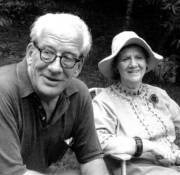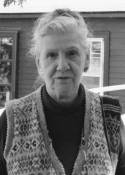
Gurdjieff International Review
William & Louise Welch
Bio-Sketches
by Patty Welch Llosa
Like many of his contemporaries around Gurdjieff in the l940’s, William J. Welch was a very well-rounded man. Born in Eau Claire, Wisconsin, on September 12, 1911, he broke away from the middle west when he went to Yale University, and (in his words) “never looked back.” After Yale he came to New York in 1933. It was a city he loved all his life for its bustling energy and stimulating diversity of people, and his first job was as go-fer for Chet Bowles and Bill Benton at the Benton & Bowles advertising agency, where he soon became the bright young executive that everyone knew would go far.
One Saturday morning in l934 he walked by the office of young Louise Michel, and because she had “the best looking legs at Benton & Bowles,” he asked her out to lunch. Thus a sixty-odd year romance began, and thus he connected first with the New York group that had been started by A. R. Orage, a mentor and substitute father of the orphaned Louise, and later with Orage’s master, G. I. Gurdjieff, when he next came to New York.
This marked a turning point in his life. As he said in his autobiography, What Happened In Between: A Doctor’s Story (Braziller, New York, l972), “a small worm continued to gnaw away at my self-esteem. It seemed increasingly shameful to know so little and pretend so much. I have long since come to the recognition that at bottom a man never really knows anything, but it seemed to me then that it would be a good thing to know something, to be in possession of a body of knowledge from which one met the world rather than always to be forced to improvise and never to have any inner discipline that was one’s own. I decided to study medicine.” He had very little money but a secret benefactor stepped forward to get him a scholarship at Columbia College of Physicians & Surgeons. He went there after a year spent at Columbia boning up on science courses which the “gentleman scholar” at Yale had largely ignored.
Welch waited to marry Louise until 1941, when he had almost finished his medical studies, though he had already become a father figure to her two children, Patty and Dick. As war broke out he became a lieutenant and then captain in the Army Medical Corps, and participated in a seminal study of treatment of malaria at Goldwater Memorial Hospital. After the war, he went on to practice medicine as an internist and cardiologist, first at Princeton, where he shared a house with the legendary dean of Princeton University, Christian Gauss; then in New York City as physician for such distinguished people as J. Robert Oppenheimer, Ben Shahn, Benny Goodman and Mayor Robert F. Wagner. He was president of the New York Heart Association from l967–1969. He also wrote syndicated newspaper columns (“Dr. Welch Says”) and conducted a call-in radio show (“Ask Dr. Welch”).
In his private life he was attending lectures by P. D. Ouspensky during the war and was one of a small circle around Gurdjieff when he came to New York in fall of l948 and winter of l949. When Gurdjieff became ill in Paris in the summer of l949, Welch was in constant contact with the doctors attending him, suggesting medicines and treatment, and when the illness became ominous in October, suggested trying a new medicine which he offered to send them. But Gurdjieff responded that he should come himself to administer it, so after an incredible one-day preparation in which he managed to get the medicine, a plane ticket and a new passport, he flew to Paris, his first trip abroad.
Gurdjieff greeted him with his usual expansive: “Ah, dock-tor, bravo America!,” but Welch saw how serious his condition was and immediately told him in the commanding voice of a doctor accustomed to make such decisions: “You should be in the hospital!” To the astonishment of those gathered around him, including his closest students and several of his doctors, Gurdjieff accepted at once, and they went together in an ambulance to the American Hospital of Paris, where Welch attended him until Gurdjieff died a few days later. He also wrote about Gurdjieff in his autobiography, “Gurdjieff remained as a light over my shoulder, with his questioning insight and his devilish way of throwing into focus the noise and fury of an upside-down world.”
Bill and Louise Welch were part of the original group of some twenty people who bought the Gurdjieff Foundation building in New York City, and took an active part in groups, special presentations of the Gurdjieff ideas, and intensive weeks of study for many years. Along with Olga and Thomas de Hartmann, they introduced the Gurdjieff teaching to Canada in the early l950’s and have left flourishing groups in Toronto and Halifax. Welch continued to follow Gurdjieff’s teaching until his own death and had a profound influence on an ever-widening group of people who wished to follow the ancient dictum “know thyself.” He was president of the New York Gurdjieff Foundation from l984 to his death in July of l997.

When Mother died on Christmas day last year, a whole era died with her, not only for me as her daughter, but for everyone close to her—her family; occupants of the house she lived in where she was the uncontested heart for so many years; close friends and students of the Gurdjieff teaching, whom she helped to a better understanding of themselves or encouraged to develop sides of themselves scarcely guessed at by anyone; and other lives she touched obliquely or only once or twice. Wherever she touched, she gave.
Yes, she was a giver. Whether it was attention, love, soul food, a warm blanket or a delicious dinner you needed, she found what it was and then provided it or a rich alternative. She deepened our deepest questions and helped us see new aspects and dimensions in them and in ourselves. Whatever our need she focused on how to provide what was necessary or help us find it for ourselves.
She gave us so much in addition to mothering, hugging away bad dreams, firmly chiding to call out the best in us. She even tried to teach me cooking—and she was an expert who could turn even wartime shortages into an infinite variety of pasta or potato dishes. I have long regretted that I resisted her efforts because she was too good a cook and, feeling I could never match her talent, decided not to try.
It is amazing that she had so much love to give, considering that she received so little as a child. Born in New York of Ukrainian immigrant parents in l905, she was taken in reluctantly by her grandparents when her mother died soon after. They told her they were her parents and left her largely alone, though she was visited infrequently by her father, who was introduced to her as an uncle, until he died when she was ten. Deceit and half-truths were hidden in every family relationship, and her happiest childhood memories were from outside the home; of school and Saturdays in Fairmont Park, at the public library or in the peanut gallery at concerts of the famed Philadelphia Philharmonic.
Forced to leave school at twelve and work wrapping parcels in the basement of Strawbridge & Clothier, a large department store, in order to bring home money for the family, she became seriously anemic. Luckily she was cared for by a friendly doctor who insisted she was not well enough to return to work, and sent her back to school. She told me only a few years ago that the day he told her this was the happiest day of her life.
In Mother’s early teens a psychologist took an interest in her exceptional intelligence, conducted experiments with her and even asked to adopt her, but by then Mother had had enough of pseudo-parents and refused outright to belong to someone else. Although this woman arranged a full scholarship for Mother at Alfred University, she turned against her in the middle of Mother’s senior year, giving her no choice but to leave college with only $17 in her pocket and head for the nearest big town to find a job.
Never a complainer, Mother rose to yet another occasion that could have induced feelings of helplessness, discouragement and distrust in a lesser soul. The next day she walked into the offices of the Rochester Democrat and explained her desperate need of a job to a kind older man who turned out to be the managing editor. He admired her courage. He gave her a shot at cub reporting in the newspaper’s morgue where she wrote obituaries day after day until her lucky break came. When a fire broke out in a downtown building and there was no reporter immediately available to cover it, she was sent to do the job and from then on was a part of the reporting staff.
Always a quick learner, she was hired a few years later by the New York American, becoming in her early twenties both fashion editor and “Mother Manhattan,” who provided advice to the lovelorn. (Wrote Walter Winchell in his column: “Louise Michel has gone from bad to Hearst!”)
In those exciting years of the late 1920s she thrived among New York’s intellectual elite and met her journalist first husband on the upper deck of an open-top Fifth Avenue bus on the way to a lecture by A. R. Orage, the well-known English editor. Orage became a father figure to her and introduced her to the teachings of G. I. Gurdjieff.
Abandoned by her first husband a few years later during the depression, she had two young children to raise and began writing advertising copy for Benton & Bowles in 1934. There she met William J. Welch, an up-and-coming adman, but held off marrying him for seven years, not wanting a family of three to burden his career shift when he decided to chuck advertising and go to medical school.
In l936, Mother was appointed director of the writers’ project of the Work Project Administration for the state of Connecticut. When she moved to New York with her new husband in 1941, she continued to write books and articles, but her deepest interest was now focused on the Gurdjieff teaching. She attended P. D. Ouspensky’s lectures in New York and later took active part in Mme Ouspensky’s work at Franklin Farms, in Mendham, New Jersey. After Gurdjieff’s death in l949, Mother became one of the leading figures in the newly established Gurdjieff Foundation of New York City and later assisted the founding of similar institutions in Toronto and Halifax. In l982, feeling that Orage had never received the recognition he was due as the principal disseminator of the Gurdjieff teaching in the United States, she wrote a vivid account of those years called Orage with Gurdjieff in America, (Routledge & Kegan Paul) which has been translated into French.
Louise Welch died peacefully in her 95th year with her family gathered around her, as gentle and loving in dying as she was in life. As David Young said at her funeral, “Mrs. Welch had a large family … each one of us felt we had a special place in her heart.”
|
Copyright © 2000 Patty Welch Llosa Photo of Louise Welch © 1985 Martha Henrickson This webpage © 2000 Gurdjieff Electronic Publishing Featured: Spring 2000 Issue, Vol. III (2) Revision: October 1, 2000 |